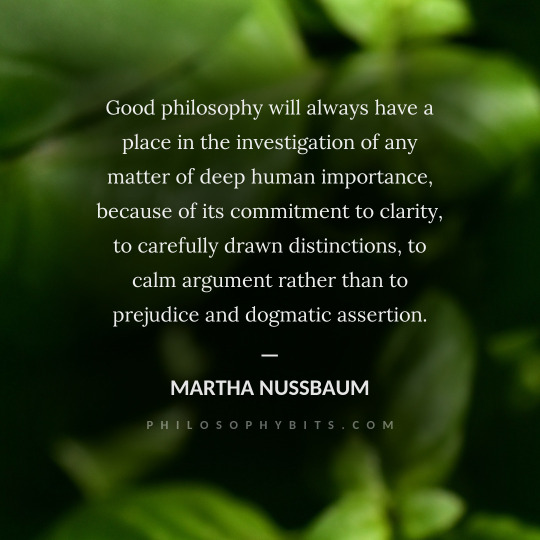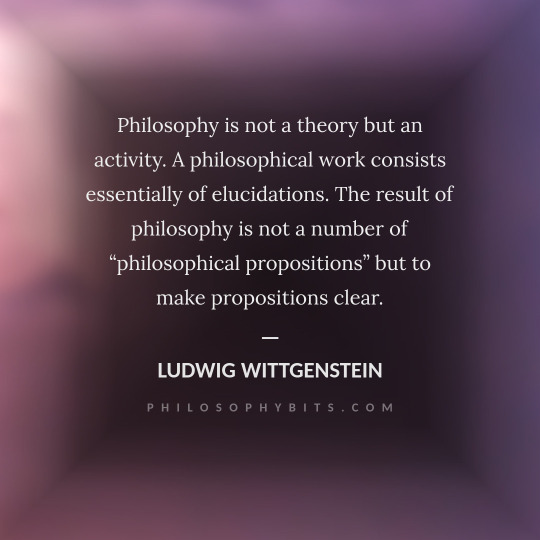#(Distinctions)
Explore tagged Tumblr posts
Quote
Our lives are lived, in actual fact, among changing, varying realities, subject to the casual play of external necessities, and modifying themselves according to specific conditions within specific limits; and yet we act and strive and sacrifice ourselves and others by reference to fixed and isolated abstractions which cannot possibly be related either to one another or to any concrete facts.
Simone Weil, "The Power of Words"
#philosophy#quotes#Simone Weil#The Power of Words#change#causality#limits#limitations#distinctions#abstraction#reification#language
114 notes
·
View notes
Quote
Male/female, white/black, good/evil, civilized/primitive, culture/nature, self/other, literature/paraliterature, mind/body, conscious/unconscious, subject/object, presence/absence, voice/writing, artist/critic, sanity/madness — these seeming conceptually egalitarian oppositions that cover vast socially exploited hierarchies are, themselves, a theme; perhaps, till fairly recently, they were the great theme of the West.
Samuel R. Delany, "Neither the First Word nor the Last on Deconstruction..."
#categories#distinctions#words#language#dualism#duality#hierarchy#quotes#Delany#Samuel R. Delany#Neither the First Word nor the Last on Deconstruction...
98 notes
·
View notes
Text
Creativity seems to require us to abandon rules and order. Growth seems to require us to let go of the structure we have already built. Unity seems to require us to get rid of any distinction between the parts. But we do not need to abandon anything. In the realm of concepts, it is possible to have it all.
When we artificially restrict ourselves to this or that position, we limit our understanding. We can instead allow for both and recognize the advantage of flexibility. Rigid attachment to a single perspective is the source of countless problems. In addition to the suffering it produces, we also become unable to see the full range of possibilities open to us, as we have closed ourselves off from them in advance.
Read more...
39 notes
·
View notes
Text


Robert Sokolowski, "The Method of Philosophy: Making Distinctions"

3 notes
·
View notes
Text

#philosophy#quotes#Martha Nussbaum#Philosophical Interventions#Nussbaum#distinctions#argument#discussion#reason#truth#prejudice#dogma
2 notes
·
View notes
Text
There's a big difference between people who can love you right and others who don't.
#reallove#healthylove#loveyouright#trueloveexists#properloved#lovedcorrectly#wholehearted#allorinnothing#deservebetter#nounsafetylove#dontsettleforscraps#qualityovercommodity#loveisaredflagneveralemonademachine#bigdifference#distinctions#notevencomparable#recognizereallove#knowyourworth#selflove#selfrespect#requiremutuality#demandreciprocity#equalpartnership
2 notes
·
View notes
Text
Surprise! Tumblr just got turned into an epic fantasy RPG, just like [your favorite appropriate media franchise]. And the Tumblr RPG's plot needs to have all of its characters covered, in roles both large and small.
That means that you are assigned to a stereotypical RPG role inside our new fantasy world. Spin this wheel to find out what you are now doing for a living.
#polls#tumblr polls#would you believe that i have consumed some fantasy media in my time#i think suikoden and wow alone cover most of these lol#(and this got inspired by thinking of just how many distinct npcs i interacted with when leveling Yet Another WoW Alt)
49K notes
·
View notes
Text
The Photograph does not necessarily say what is no longer, but only and for certain what has been. This distinction is decisive.
Roland Barthes, Camera Lucida: Reflections on Photography (tr. Richard Howard), sec. 36
#quotes#Roland Barthes#1980#French thought#French theory#theory#philosophy#photography#identity#duration#distinctions#definition#testimony#evidence
0 notes
Text

modern-day changeling tales
#gravity falls#stanford pines#stanley pines#ford pines#stan pines#comic#my art#hey what if you were replaced by a changeling that didn't bother to act like you at all#that had a *very distinct* physical difference from you#and the only people who would care enough to notice#were a man who destroyed his own brain because of you#and the changeling itself#would that be fucked up or what?
8K notes
·
View notes
Text

thinking about ford "human blood tastes better" pines

ford "i have been desiring blood more than usual" pines

stanford "was bitten by a fruit bat but still wrote the sentence 'i have been desiring blood more than usual'" pines
#gravity falls#ford pines#stanford pines#what is WRONG with him jfkdlsjklsa#he and bill really WERE made for each other. lord alive man.#ford how many different types of blood have you definitely not sampled to have a distinct ranking in which human blood is the best#ford you wrote this BEFORE you went insane. ford.#this was you at your normalest. comparatively speaking.
18K notes
·
View notes
Quote
Reality is infinitely diverse, compared with even the subtlest conclusions of abstract thought, and does not allow of clear-cut and sweeping distinctions. Reality resists classification.
Fyodor Dostoyevsky, The House of the Dead
#philosophy#quotes#Fyodor Dostoyevsky#The House of the Dead#reality#abstraction#abstract#idealism#realism#distinctions#language
473 notes
·
View notes
Quote
I feel a first freedom seizing me little by little. . . . Since until today I never had so little fear of lacking good taste [...] For now the first timid pleasure I am having is realizing I lost my fear of ugliness. And that loss is such goodness. It is a sweetness. I want to know what else, in losing, I gained. I don’t know yet: only by reliving myself shall I live.
Clarice Lispector, The Passion According to G. H.
#distinctions#values#beauty#aesthetics#taste#freedom#quotes#Lispector#Clarice Lispector#The Passion According to G. H.
172 notes
·
View notes
Text
As our categories become finer and more precise, we gain the ability to refer to more and more specific parts of the world. Sometimes we create categories and then later realize our distinctions do not work. For whatever reason, they do not accurately reflect the world, and so we modify our schema, adding new words or redefining old ones in order to fix the problem.
Most of the changes we make are practical ones because language is primarily a practical tool for communicating with others. But sometimes our categories become problematic for reasons that go beyond the practical. Sometimes we discover our categories are harmful or even violent. Such categories actively limit us. In addition to the harm they directly cause, they confine us to ways of seeing the world that are detrimental to our potential growth. They do this because language itself is normative.
Read more...
15 notes
·
View notes
Text
Sometimes we are given the distinction not in an abstract formula, like "ignorance is not negligence," but in a story or legend or parable or illustration. The story may hold the truth for us in an urgent, concrete form; we know a distinction of general import is at work in the story and preserved in it, but it may not be possible to state abstractly what the terms of the distinction are. Often what is at issue is more richly possessed in the concrete recital rather than in the abstract statement; and always the abstract statement needs to be nourished by cases if it is to be more than an idle, merely linguistic distinction.
When we do rest with the concrete recital, we still realize that it holds a distinction (or an identification) that goes beyond the particulars of this instance; it urges beyond itself and wants a distinction (or identification). The story of Cinderella, for example, tends toward some such distinction as "to be held in disdain by small-minded people is not to be worthless," or perhaps "excellence now unrecognized is not excellence forever unrecognized." The story has import because it urges us toward such knowledge. Then there is Aesop's fable of the dog who had a piece of meat in his mouth, saw his own reflection in the water, tried to get the other piece of meat, and lost the one he had; this fable tends toward an obvious identification such as, "to covet can be to lose what you have," and it plays also on a more subtle, almost ominous distinction of appearances, something like "your own image is not someone else."
The stories are obviously better than my clumsy abstractions, and stories often seem profound because they urge a distinction but do not make it obvious what the distinction is. What, for example, could express the distinctions and identifications at work in von Hofmannsthal's Die Frau ohne Schatten, Poe's The Purloined Letter, and Shakespeare's The Tempest? But even if the concrete is in such cases better than the abstract, the concrete is good only because it urges toward the abstract.
Robert Sokolowski, "Making Distinctions"
Samuel Johnson told Boswell about a headmaster who "was very severe, and wrong-headedly severe. He used to beat us unmercifully; and he did not distinguish between ignorance and negligence; for he would beat a boy equally for not knowing a thing, as for neglecting to know it."
Not that a beating would be justified in either case, but I do think the distinction has more force in that short anecdote, even if it's made explicit.
1 note
·
View note
